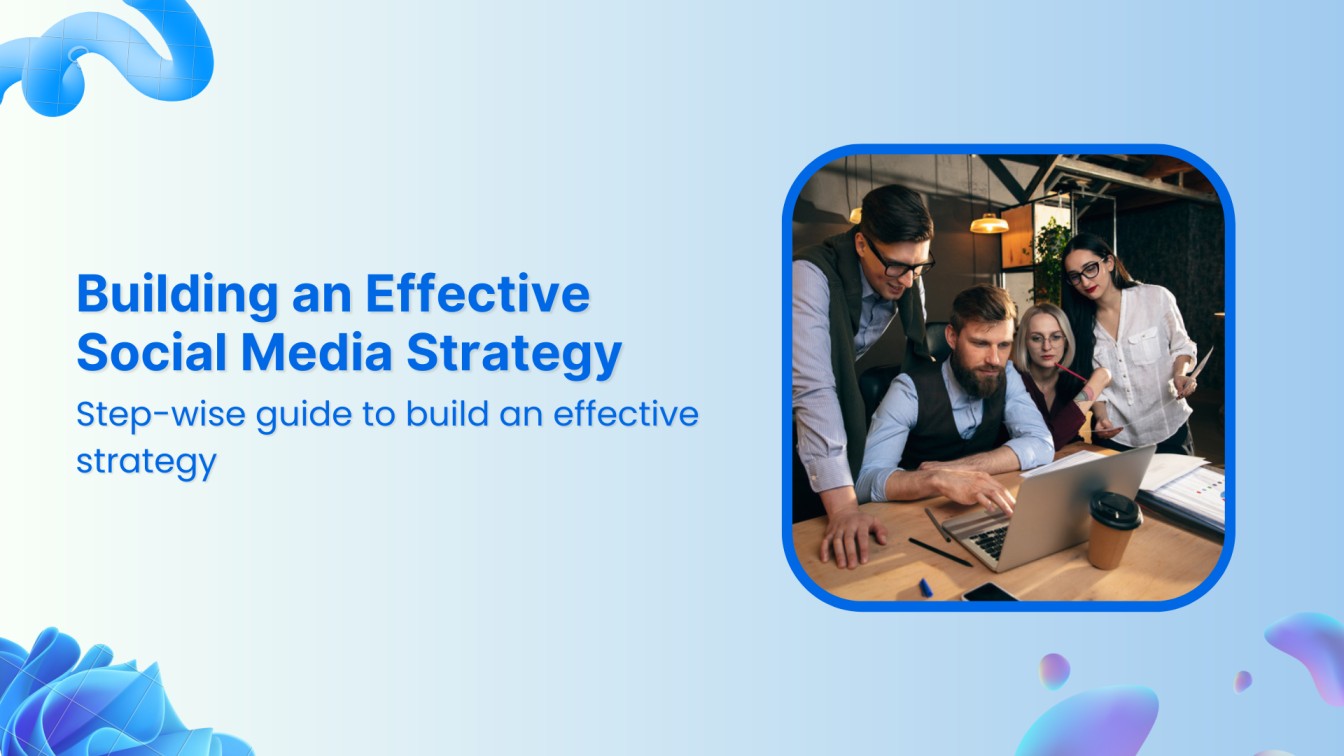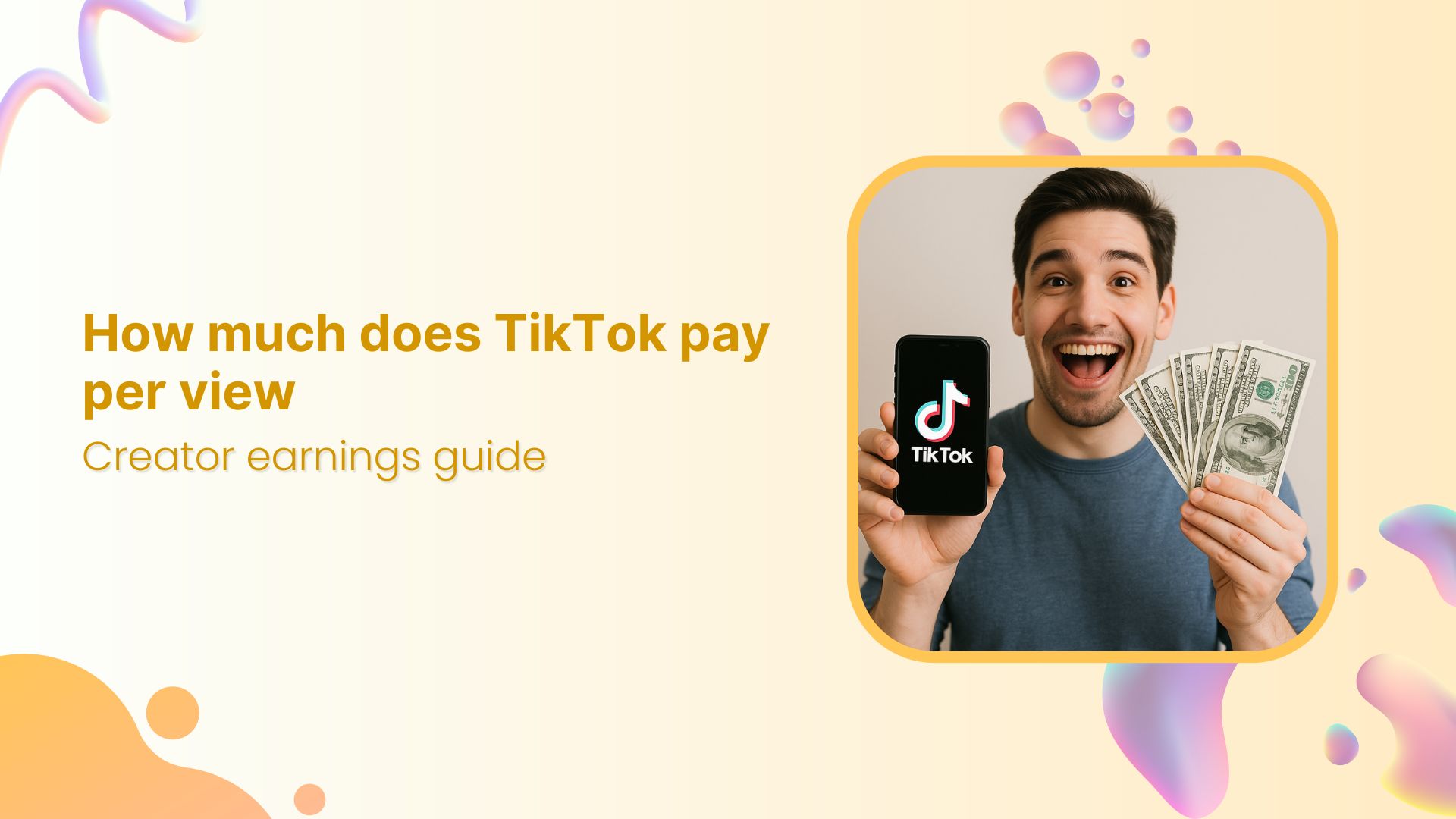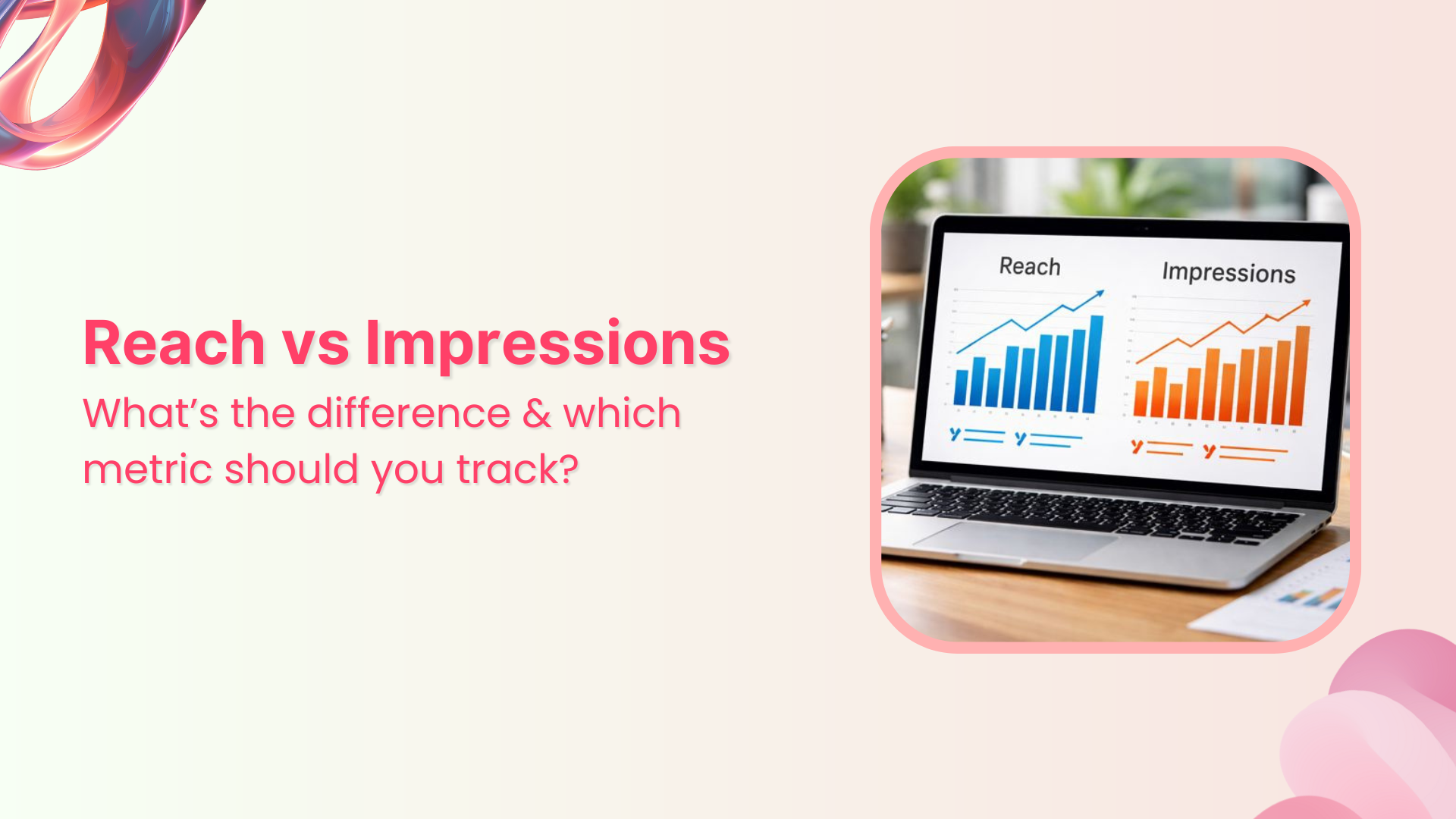Bulk-generate & schedule posts in seconds with Smart Scheduling. Try now!
Most Successful Social Media Strategies in 2022

On average, every person spends 144 minutes per day on social media and messaging apps. According to Statista, social media networks have almost 4 billion users in 2021, which is 2 billion more users than in 2017. Yes, WOW!
Imagine the amount of content being published daily by 4 billion users. Almost half of the world’s population is sharing content on social media. According to the Content Marketing Report, 45% of marketers produce over 5 pieces of content per week and publish over 11 social media posts at the same time.

But let’s take a step back from these mind-blowing numbers and focus on why you’re reading this article ⎼ to see which are the most successful social media strategies to implement in 2021.
With more content published than ever, it’s a tough job to manage social media and create content that will stand out and become viral. That’s why you should have a strategy, an action plan that will help you scale your social media efforts.
Here’s a list of the most successful social media strategies in 2021:
Goal set, goal achieved
When you’re working on a social media strategy, the very first step is to set your goals and objectives. This will help you focus on the end goal and have a better overview of the entire social media campaign. Also, once you have your goals set, creating an action plan accordingly should be a lot easier.
If you’re not setting goals from the start, tracking the performance of a social media strategy could be challenging. And here comes the part where you “decipher” the why behind your social media strategy:
-
-
- Why do you wanna be on social media?
- What are you looking for?
- What outcome is expected?
- How much do you want to invest in social media?
-
Once you have these questions answered, it’s time to draft and set your goals. Here are a few examples to use as guidance or inspiration.

Build brand awareness
With millions of people scrolling through social media channels all day, it’s the best place to build brand awareness. It’s a crucial goal if you’re focusing on boosting conversion rates. People need to know who you are and what your products/services are about before whipping out their credit cards. It’s a great way to help people understand your brand, product, company, and resonate with the values you’re promoting.
Boost engagement
Every piece of content should encourage your audience to engage in a conversation with you. Your potential and actual customers will appreciate your responsiveness and dedication. Building a relationship with your audience is always a good idea. Create content that will boost engagement on social media channels because it is also a great way to start nurturing leads.
Increase conversion rate
Every social media move is an opportunity to generate new leads. Whether it’s an image, text, video, or carousel post, think of it as an opportunity to convert prospects and move down the sales funnel. But don’t overlook brand guidelines at this stage.

Statistics have shown that video is the likeliest content format to increase conversion rates. You can go for:
-
-
- A simple short video (because sometimes people get distracted easily)
- Video testimonials (because who isn’t interested in finding out more about the product/service they’re buying?).
-
Statista releases in its research that 31% of the consumers surveyed prefer to use social media for sharing feedback about a product and 33% prefer reaching out with a customer service issue or question.
Research your target audience
According to The Marketo Engagement Gap report, 56% of consumers believe brands need to have a deeper understanding of the consumers’ needs. Marketo report also shows that 51% of the consumers surveyed believe brands share too much irrelevant content which makes them frustrated.
Social media strategies are all about giving the right content to the right people in the right place. It’s impossible to create content that can be equally interesting for everybody. Before creating something that can be useful and engaging to your audience you should get to know your audience and understand their behavior.
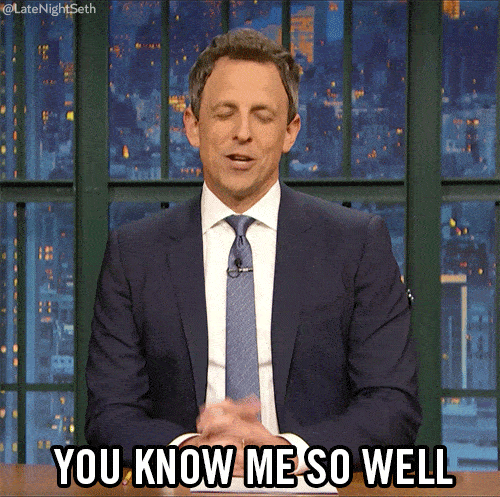
Scaling a business relies on the connection you’re making with your audience. It’s crucial to know who you should target and how to deliver your product/service into the right hands.
The first step to defining your target audience on social media is to narrow down the general characteristics of who you are reaching out to. Start with a brainstorming session where you analyze and determine the audience demographics and then move to specificities like gender, age, education, income levels, interests, hobbies.
Another way to define your audience is based on purchase intention. This type of audience research applies mostly to e-commerce businesses.
Analyze your product before trying to sell it to the wrong group of people:
-
-
- What problem does your product/service solve?
- Who can benefit from it?
- Who is buying your product/service now?
-
Deep dive into the audience’s behavioral interest and try to notice the point of engagement at each step.
Having a target audience is like having Google Maps but on social media. Without it, your content will get delivered to the wrong location. If we skip the dramatic statement I just made, let’s just say that knowing your target audience will give a direction to the content without the risk of getting overlooked.

Here’s a good exercise to define the target audience: imagine your ideal customer and build a story around their personality. Give them a name, a job, family status, a range of interests, favorite brands, etc. It will be easier to define your audience if you have a solid starting point.
Once you get a clear picture of your audience, it’s time to move on to the next strategy.
Choose your social media channels
Now you have set your goals and defined your target audience. It’s time to pick the most fitting social media channels for your brand. Separating the messages and content according to the channel you’re posting to will help you reach the right audience and draw their attention.
For example, posting a Reel on LinkedIn wouldn’t be useful for the audience you have there as the type of channel is more professional and business-oriented.
If you want to present your business in a more visual way, you should probably go for Instagram. Turns out that having a fresh, aesthetically unique Instagram grid will turn your profile visitors into followers. Yes, all that is thanks to a cool grid.

You should go for Facebook if you’re looking to cover the interests of a wide range of people and diverse age groups. Running Facebook Ads will also come in handy if you’re about to run paid ads for your business and don’t have enough time to learn Google Ads.
If your brand is youth-oriented you’d probably want to share memes and gif reactions. Twitter is the place to do so. Crafting your own viral trends would be a great strategy to get that conversation going.
On that note, to make the creation process go smoothly, it might be a good idea to use a social media collaboration tool. Not only could it eliminate all the constant back-and-forth on emails, but it also makes collaborating on Twitter content (just an example — it could be any platform) quite fun.

There is no right or wrong when it comes to how many profiles a business should have on social media. But it needs to be decided at this step. The important thing to remember is that to make your effort sustainable and not overwhelming you should pick the channels accurately.
The next step would be to find the proper publishing time. It’s important to post content at relevant times for the relevant audience.
Pick your time right! You’ve worked hard on creating that piece of content and it would be a pity if the content is not seen.
Focus on one thing and do it perfectly, rather than being everywhere at once.
Create engaging and valuable content
Think of it as an active user on social media. Would you rather see a 15 minutes single-frame video of someone speaking about the new iPhone 13, or a 5 minutes review video comparing the last 3 iPhone models including live testing on every iPhone and a shortlist of main differentiators? Well, I bet you’d go for the second option.
That is the meaning of engaging and valuable content. It should offer interesting, inspirational, useful information and entertaining facts. Create content that will stand out in the crowd. Share content that is new to your audience, or present well-known information from another angle, but share something the audience can also relate to.

You can consider sharing personal experiences. And don’t forget to add your personality there. What can be more original than this? Statistics are hot too. Especially for number-loving geeks like me.
If you’re just starting publishing posts on social media, consider experimenting with different post types. Don’t be afraid to test it. Try posting videos, quotes, blog posts, testimonials, statistics, and even host a live session. Give them all a try, but keep an eye on the analytics too.
This will help you determine what kind of content your audience is more likely to engage with. Some might love blog posts for their informative nature, some might like memes or short funny videos. The most important thing is to find the hook for your audience and motivate them to take action and engage.

Build Trust with Curated Content
Discover, brand, and share the best content with your audience. Establish yourself as an authority and turn leads into loyal customers.
14 days free trial - no credit card requiredBe efficient
And that’s just one side of the story. Creating content for social media takes a lot of time. Studies say that it takes 5.4 days to create and publish a piece of content. Scouring through the internet to search for inspiration, news, and updates, switching tabs from where you put all the ideas to the doc where you’re creating the copy, and so on. Who hasn’t been there?
But here comes the savior – a social media content calendar. It can be used to plan where, when and which piece of content will be published. Simply put, it makes social media campaigns easier to manage.

Since we’re talking about social media campaigns I need to say that efficiency is the key to nailing them. To be efficient, focus on organizing and prioritizing your tasks. I’d start with setting up a calendar for all posts and organizing them into categories, by frequency and type of content. Next up will be picking the time slots and scheduling social media posts on every platform.
To have all of this done and not get overwhelmed, you might want to think about a social media collaboration tool built for this exact purpose. This way you can schedule all of your Facebook posts, collaborate on Instagram posts, and create those funny memes posts on Twitter without risking the content quality and losing a lot of time.
Set up a social media calendar
In case you missed me talking about social media calendars in the previous paragraph, here’s me outlining its impact on your future social media campaigns.
Now it’s time to create the calendar itself. Step one: think ahead of time. Mark out the holidays (big ones like Christmas, New Year’s Eve, Thanksgiving, etc; and the other important ones like name days, World Health Day, etc). Then think about future events that can be relevant to your brand/company – International Coffee Day, the anniversary of your brand/company, employees anniversaries, and others you find relevant.
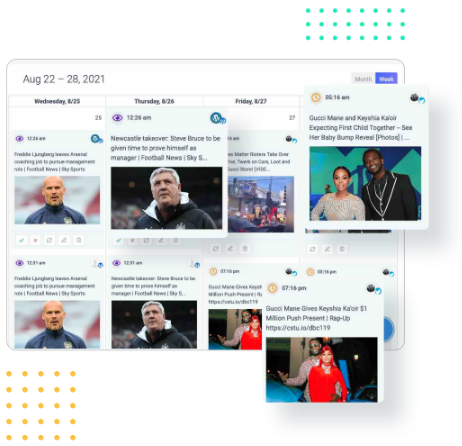
Social Media Calendar for Digital Agencies
Organize all your social posts and visualize your client’s social media content plan with an interactive Content Calendar
14 days free trial - no credit card requiredStep two: determine what kind of social media content you want to create for your audience to engage with. Here’s what comes to my mind:
- News -company news or updates (like feature launches), or industry-related news.
- Testimonials – they can offer a boost of credibility and trust to your audience and potential customers. Sharing testimonials is always a good-to-go-with kind of content because of its personal touch.
- Q&As – easy to create and a great way to start a conversation with the audience.
Step three: create the calendar layout. Or just use a social media management tool. Most times these kinds of tools integrate a calendar in their platform where you can get a better overview of the entire campaign.
Work with influencers
If you’ve read about influencer marketing before (skip the intro), you might have an idea why attracting influencers to collaborate on social media is becoming a solid marketing strategy. If not, buckle up!

Influencer marketing is a type of social media marketing that involves product/service mentions and reviews from influencers – social media users that have a large number of followers and are viewed as experts in a specific niche (beauty, lifestyle, sport & fitness, and so on).
Let’s debunk the first myth: working with an influencer doesn’t automatically lead to increasing your sales. Influencer marketing is more about building authority for your product/service and finding a given topic to connect with a broader audience.
Finding influencers isn’t high-level math. Hands-down the easiest way to find influencers is on social media. But you still have to do research before starting a collaboration with an influencer. Look into the type of influencers that could be fit for your brand: would it be celebrities? macro or micro-influencers? What niche are they active in?

To ensure a fruitful and smooth collaboration with the influencer you’re about to choose, set common goals and outline objectives. Together you can set up a timeline to have a better overview of the campaign progress and results.
Draft a contract. Here’s the stage where you should be very specific about how you see the collaboration playing out. Timing is very important. When setting the last details of the collaboration be sure that the contract outlines the set times for previewing and posting the content.
And don’t be afraid to hand over some of your control over social media. Contrary to traditional marketing, influencer marketing is about the authenticity of influencers. Each one of them has different approaches and content styles. Your vision may differ from theirs, but that doesn’t mean you won’t be able to collaborate.
Wrapping up
That was all, folks. Now that you know what are the most successful social media strategies in 2021, it’s time to implement them. I can already imagine you diving into social media campaigns as you’re reading this, but don’t forget to keep an eye on analytics too. Good luck with rocking on social media!
Recommended for you

Social Media Management Costs in 2026: A Pricing Guide for Businesses


Powerful social media management software
14-day free trial - No credit card required.
